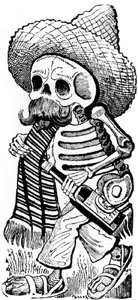![[Metroactive Features]](/gifs/feat468.gif)
[ Features Index | North Bay | Metroactive Home | Archives ]
Open Mic
Smoke & Candy
Remembering the dead on All Hallows' Eve
By Noelle Oxenhandler
"WOE UNTO THOSE that are consoled" is the opening line of one of the poet Rilke's most famous letters. He wasn't writing in the wake of a national catastrophe, he was writing to a countess who had lost her father, but a few days ago the words came back to me as though he had just written them for this particular moment in America.
I'd gone to my local grocery store and, as I walked up to the doors, I was amazed to see that there were pumpkins for sale. Something about them made me feel I should avert my eyes, gather a long black veil close around me. There was something too vibrant, almost obscene, in their orange ripeness. And though they were probably grown in fields not far from my house, the pumpkins looked like a form of exotic contraband, like something smuggled in from a very foreign, far-off country.
"Surely you don't mean we're going to do that this year, do you?" I felt like saying to the young man in a white apron who was arranging the pumpkins on a bale of hay. "This is not the time for jack-o'-lanterns and candy corn, for children in pink tiaras and batman capes."
The very thought of Halloween seemed utterly inappropriate this year, like mixing a festival and a funeral.
But then I remembered where I'd been last year at the end of October.
It was a small town in southwestern Mexico, about an hour from Puerto Vallarta, where I'd gone with a small group of friends. Though we'd been told it wasn't a town that did much of anything for the Day of the Dead, at dusk we found ourselves irresistibly drawn to the cemetery.
The closer we got, the more charged the atmosphere became. People were streaming in from all directions: in beat-up cars, on bicycles, on foot. Many of them were carrying round wreaths, wrapped in plastic, that looked like big pizzas made of ribbon. Others were carrying shovels, rakes, brooms, and radios.
In stalls just outside the cemetery's stone wall, women were cooking tortillas, tamales, and corncobs in their husks. For a few centavos, you could buy a hot snack and chomp on it as you lingered in the warm air around the stalls. The cemetery itself was obscured by smoke: the gray smoke rising from the women's hot coals mixed with a bluish haze on the other side of the wall.
Entering through the cemetery's gate, we saw where the blue haze came from. The cemetery was in a state of disrepair--perhaps from the most recent earthquake that had rattled its walls and made cracks in its paths. Everywhere there were piles of loose stone and broken chunks of cement. In small clusters around the graves, family members were tending the site. They'd gather the stones and set them aside, then rake the dead leaves and grass, sweep the litter, make a pile of the debris and set it on fire. As they worked, they chattered to one another. Some played music from their radios. Children darted in and out, leaping from one grave to the next, playing hide-and-seek behind the headstones.
Some people looked quite sad. When we peered over their shoulders, we saw that the graves they were tending were fresh. My friends and I had come with a man named Carlos, whose father had died the year before. "He died very suddenly," he told us. "He wasn't very old. He would be so happy to know that my daughter is engaged."
Taking a handkerchief from his pocket, Carlos wiped a layer of ash from the photograph of his father's face that smiled from under its small dome of glass.
Remembering the intimacy of that gesture, of the evening's mix of sorrow and gaiety, I thought of the words that followed Rilke's "woe unto those that are consoled. What he meant by that strange line was that we must not forget the intimate connection between life and death. He was actually offering the countess what he felt to be the truest consolation: the knowledge that "life always says simultaneously Yes and No" and the belief that this knowledge need not be overwhelming.
"One should not fear that our strength might not suffice to bear any experience of death," he wrote, "even were it the nearest and the most terrible; death is not beyond our strength; it is the measure mark at the vessel's rim: we are full as often as we reach it--and being full means for us being heavy."
Perhaps, with our hearts that our heavy indeed, it is precisely the simultaneity of Yes and No that we can grieve and celebrate this year on the last night of October. Though the ancient meaning of All Hallows' Eve has been all but lost to us in the chainstore flood of ghoulish props and packaged treats, perhaps there is something that we might retrieve, something that our Mexican neighbors seem to understand so well. Then, in the light and shadow of carved pumpkins, we grown-ups could keep each other company, as we remember our so recent dead, and as our children gather candy amid the rubble and the smoke.
[ North Bay | Metroactive Home | Archives ]
Copyright © Metro Publishing Inc. Maintained by Boulevards New Media.
![]()

Glen Ellen writer Noelle Oxenhandler is the author of 'The Eros of Parenthood' (St. Martin's Press, 2000) and a longtime contributor to 'The New Yorker.'
From the October 25-31, 2001 issue of the Northern California Bohemian.